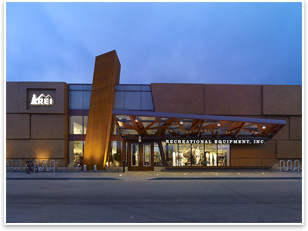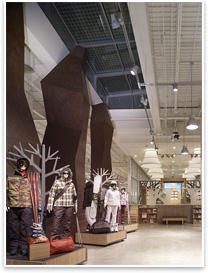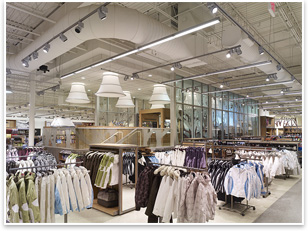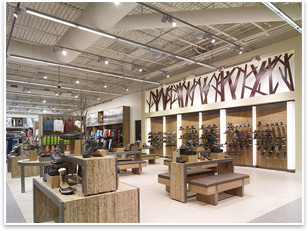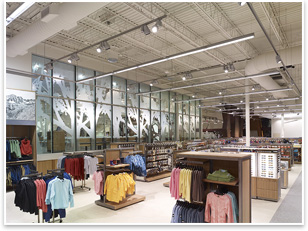
Outdoor Retailer Sees Green Inside and Out by Heather Livingston
Summary: Boulder, Colo., is the setting for the newest adventure for Recreational Equipment, Inc. (REI). Opened on October 5, the LEED®-registered prototype store for the outdoor gear and apparel retail cooperative was designed by Gensler. Key to the company’s commitment to protecting nature and natural areas, REI began introducing sustainable elements into their building designs with the 1996 opening of their Seattle flagship store. The company’s Boulder store was designed to be a working laboratory to test and analyze the performance of sustainable features and new retail concepts.
Sustainable features Additional solar features include a centrally located glass atrium skylight that lets in sunlight while monitoring and capturing the heliacal energy to power the store through building integrated photovoltaics (BIPV). “It is photovoltaic cells in a glass sandwich on the roof of the light monitor, which provide energy for the store,” says Skillin. She notes that PV panels on the roof also power the solar thermal hot water system. The combined strategies are expected to save about 20 percent in its energy costs over standard retail facilities, or the equivalent of powering up to three homes for a year.
Additional sustainable strategies include low-flow fixtures in the staff and customer facilities; use of bamboo, cork, and recycled rubber in the floors, perimeter walls, fixtures, displays, benches, and tabletops; reuse and recycling of previous store fixtures; and use of low-VOC and local materials whenever possible. According to the REI Web site, the Boulder store aligns the cooperative’s mission and core values with its commitment to reduce their environmental footprint. The overall design goal was to increase energy efficiency, water conservation, and indoor air quality. In addition, the company notes that it is working toward creating zero waste by 2020. In tandem with using sustainable building practices, REI also actively encourages its employees to recycle all cardboard, plastic, aluminum, glass, and paper in the store and to compost items from break rooms and cafes.
Jacobs says that the first several months of the design process were entirely non-design work, meaning no sketching took place. What Gensler learned in those early meetings was the importance of the REI community. “They have a very loyal following, and people who have been shopping at REI for decades now are incredibly passionate about the company and the brand,” Jacobs explains. “We felt, as well as the REI team, that that was something we could leverage further.” The way they leveraged that loyalty and passion was with the creation of a nearly 2,000-square-foot community center located in the heart of the store. The community center was conceived as a way for REI to give back to its community and is designated as a resource area to learn about the outdoors and opportunities to protect shared natural spaces. It will also serve as a venue for events, presentations, and demonstrations by REI and its community partners.
Located adjacent to the book, map, and travel center, the elevated glass-enclosed community center is visually tied to the rest of the store, but allows acoustic privacy for talks and other events. When no store or community events are scheduled, the space is open for small, informal gatherings. REI “green vest” experts will staff the center to answer questions ranging from where to find local trails to how to schedule a travel expedition to where to volunteer for environmental preservation projects. On the result of the project, REI’s Director of Store Development Dean Iwata said, “REI and Gensler worked together to create a store that embodies the values that make REI unique: community involvement, environmental stewardship, and a commitment to serve as a gateway to the outdoors.” |
||
Copyright 2007 The American Institute of Architects. All rights reserved. Home Page |
||
home
news headlines
practice
business
design
recent related
› Berkeley City College’s Skylighted Quad Earns LEED Silver
› LEED-Registered Project Builds on Indigenous Technologies
› BuildingGreen Announces 2007 Top-10 Green Building Products
Find out what the Retail and Entertainment Committee knowledge committee is up to.
Visit the AIA Committee on the Environment online for more information about sustainability issues.

